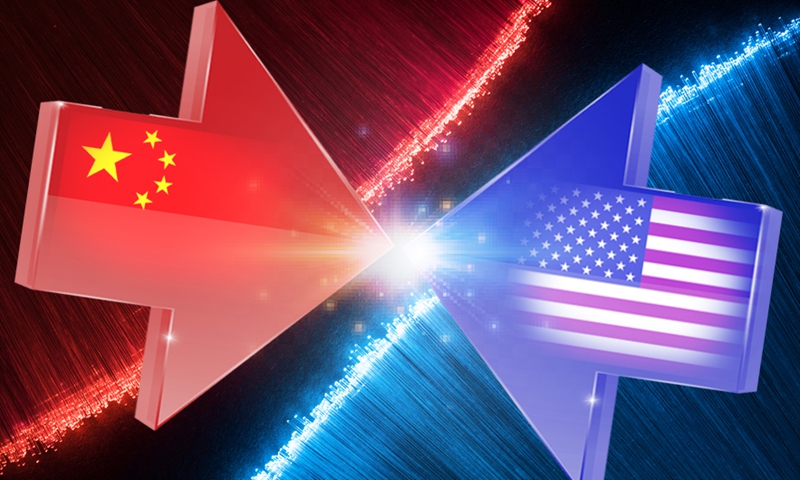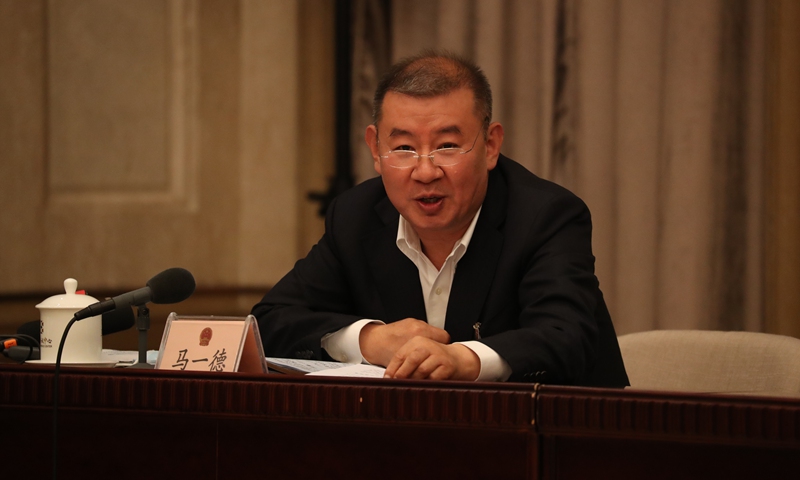Lawmakers urge sovereign immunity law to retaliate for US abuse of litigation over COVID-19
By Cao Siqi and Hu Yuwei Source:Global Times Published: 2020/5/27 19:23:41 Last Updated: 2020/5/27 19:55:41
Legislation to grant Chinese rights to sue foreign countries in domestic courts

China US Photo: GT
The motion's initiator, Ma Yide, is a deputy to the National People's Congress and law researcher at the Beijing Academy of Social Sciences. Ma told the Global Times on Wednesday that facing several political farces by some US politicians and their allies, from repeatedly politicizing the disease and stigmatizing other countries, to the cliché of claiming compensation, it is urgent for China to enact a state immunity law to counter US' abuse of litigation.
Such a move will ensure Chinese citizens' and companies' rights to sue the US over its blame game and cover-up of information during the pandemic, said Ma.
In March, multiple civil complaints began to surface in Wuhan, Central China's Hubei Province, where citizens resorted to techniques such as lawsuits and petitions to demonstrate their anger against some US politicians' blame game.
Liang Xuguang, a lawyer based in Wuhan, has filed a lawsuit against US government agencies over the suspected intentional spread of misinformation over COVID-19. Liang urged the US to publicize the number of "influenza deaths" that were caused by the novel coronavirus.
However, it is not easy for such cases to proceed because China has adopted the principle of absolute immunity of foreign state sovereignty and their property, meaning that Chinese citizens, companies and governments have no legal right to sue other countries in China's courts. They have to sue in foreign countries' courts, which will increase the costs of lawsuits and put them at a disadvantage.
In contrast, the US, Canada, the UK and the EU follow the restrictive immunity principle, which allows their citizens and companies to sue foreign countries, individuals and enterprises in their homelands.
"Many believe that the US has hidden key information and failed to handle the epidemic properly, which led to the global health crisis. Why can't Chinese citizens and companies sue the US government?" Ma asked.

Ma Yide, an deputy to National People's Congress Photo: Courtesy of Ma Yide
According to Ma, along with the deepening of international exchanges and the acceleration of globalization, China is facing more and more litigation in other countries due to the proliferation of conflicts and contradictions in economic and trade contacts.
"In most cases related to state sovereign immunity, China was the defendant. It was very hard for China to judge whether the verdict was justified and fair. Although China can use its absolute immunity principle as a type of political diplomacy, in the long-term, it is not the best way to solve the problem," said Ma, noting that the uncertainty associated with such tactics will make Chinese overseas investors confused and affect their interests.
Now, some countries, led by the US, have used immunity laws to pursue abusive litigation against China over the pandemic, which not only shows international hegemony, but has also sounds an alarm to China; China should improve its legislation on state sovereign immunity as soon as possible, Ma said.
The proposed motion reflects China's efforts to safeguard its national interests and enterprises' legitimate rights amid the complex and volatile international situation, Shen Yi, director at the Research Center for Cyberspace Governance of Fudan University in Shanghai, told the Global Times on Wednesday.
Judicial state immunity is normally established on a reciprocal basis. However, some hegemonic powers have compelled China to construct a defense system to resist their legal bullying, said Shen.
Meanwhile, legal experts stressed that the legislation does not aim to provide a tool for Chinese citizens to sue foreign governments arbitrarily.
In general, China will respect foreign countries' state immunity. But in certain circumstances, the law will allow Chinese courts to accept lawsuits against foreign governments, Mao Junxiang, executive director and professor at the Human Rights Studies Center, Central South University, told the Global Times.
"In the US, the law mainly is applied to commercial disputes," said Mao. "However, in recent years, it has been extended to cover more allegations, such as the crimes of infringement or terrorism."
"How China defines its legal application depends on the Chinese government's judgment and stance," Mao said.
Posted in: SOCIETY